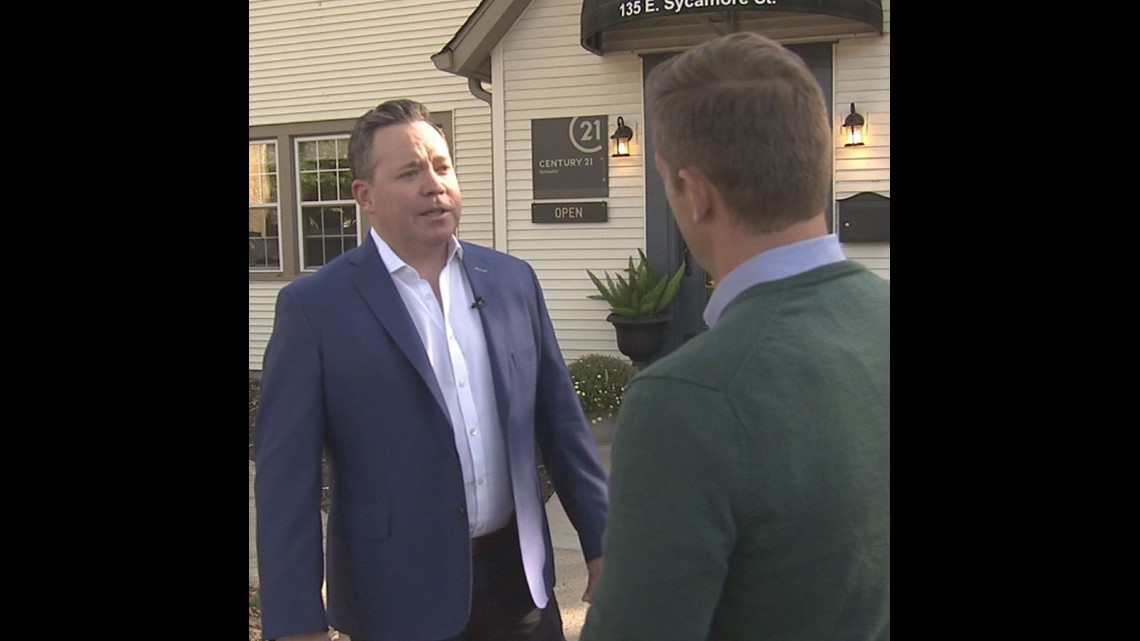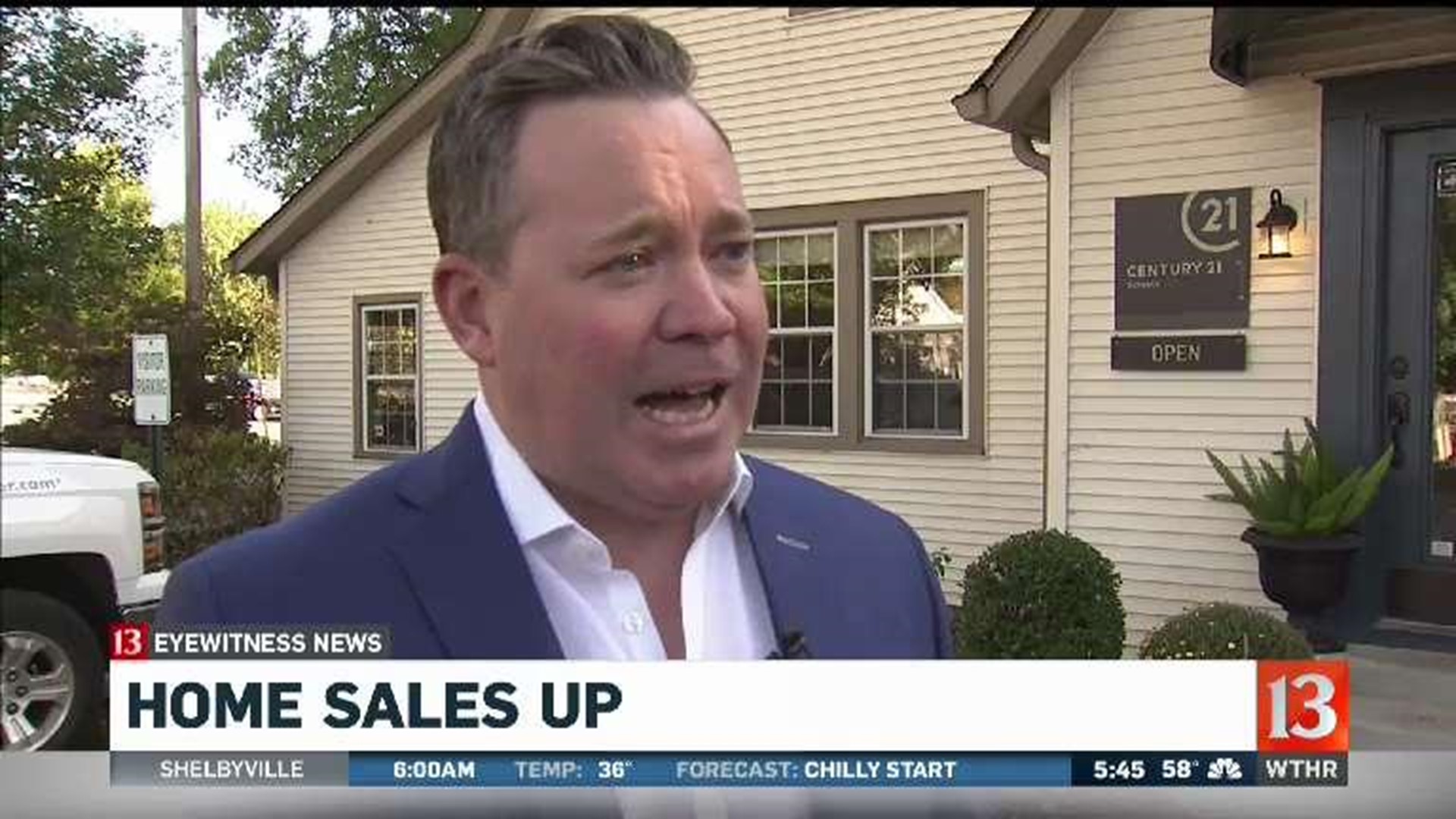INDIANAPOLIS (WTHR) — New numbers from the Metropolitan Indianapolis Board of Realtors (MIBOR) show the median sales price of a home was $189,900 in September, up 5.5% from one year ago.
Real estate experts say it's thanks, in part, to an inventory shortage. Simply put, there are more buyers than homes available.


"The story of the month continues to be the lack of housing inventory in the central Indiana market," said Shelley Specchio, MIBOR Chief Executive Officer, who added that pending sales were up when they typically start to slow down this time of year.
Others agree.
"I've been doing this for more than 15 years and this is the most active fall that we've seen," said Jason O'Neil, President and Chief Operating Officer at Century 21 Sheetz in Zionsville. "There are so many buyers entering the market. Interest rates are low, conditions are favorable. So people want to buy … there just aren't enough for them."
Central Indiana Single Family Home Median Sales Price
County 2019 2018 Change Bartholomew $186,000 $185,000 0.5% Boone $289,900 $267,000 8.6% Brown $242,000 $209,000 15.8% Decatur $141,200 $128,000 10.3% Hamilton $300,000 $290,000 3.4% Hancock $202,500 $187,900 7.8% Hendricks $223,612 $205,000 9.1% Jackson $136,000 $124,900 8.9% Jennings $131,950 $106,750 23.6% Johnson $200,000 $180,000 11.1% Madison $119,975 $105,000 14.3% Marion $160,500 $150,000 7.0% Montgomery $126,000 $115,500 9.1% Morgan $175,000 $164,000 6.7% Putnam $155,750 $143,950 8.2% Shelby $138,000 $129,958 6.2% Source: MIBOR September 2019 Market Summary
According to MIBOR's September market summary, there were 6,341 active listings in the 16 county region the board covers. That's down from 6,848 one year ago.
It's a seller's market, meaning demand exceeds supply.
O'Neil said that climate can be challenging for house hunters who are competing with so many others to buy a home.
Three Things to Consider Before Starting Your Home Search
 1. Shop for a lender and get pre-approved before you see homes.
1. Shop for a lender and get pre-approved before you see homes.
"Often times we find buyers are competing with investor offers or cash offer," said O'Neil. "Being fully pre-approved and ready to go before you even look at a house is the number one way to compete with a cash offer or an investor offer."
2. Make a list of your must-haves in a home ... and what you're willing to sacrifice. And be willing to be flexible.
"You're going to (want to) start with a list of anywhere from 10 to 15 things that are requirements and narrow it down to your five absolute must-haves," he said.
3. If you see the house that works for you, it's ok to make an offer even if it's the first house you've seen in person.
"I think sometimes people feel like they need to vet our all the inventory to compare things before making a final decision," he said.
Cham and Jamie Kong are searching for their next home in Zionsville. They say researching homes for sale online saves time.
"There are a lot of great resources online," said Jamie. "People are good about putting lots of things out there ... pictures of the inside, the outside of the house and so you can get a good idea about what you're walking into before you go to the showing."
Five Things To Consider Before Putting Your Home on the Market
 Does a seller's market mean you'll easily sell your home?
Does a seller's market mean you'll easily sell your home?
Real estate experts say the short answer is: not necessarily.
"Homes that are in the best condition and best-priced are getting offers faster and at higher prices than their competitors who can languish on the market," said O'Neil.
Before selling your home, do your due diligence to make sure you have the best chance at success.
1. Conduct a thorough strengths vs. weaknesses assessment of your home. Compare your assessment against the homes that are on the market or have recently sold. Break these down into the following categories:
- Exterior Assessment (curb appeal, landscaping, brick, siding, pool, sport court, lot position)
- Interior Functional Assessment (bedrooms, bathrooms dining room, finished basement, walkout basement, ensuite bathrooms)
- Interior Aesthetic Assessment (color scheme, updated bathrooms, updated kitchen, types of materials)
- Mechanical Assessment (age of appliances, age of the roof, age of HVAC system, age of water heater)
2. Engage a stager. Getting professional staging advice can make a meaningful difference for two fundamental reasons. First, it will dictate how your home appears online as buyers are shopping. Second, this process is designed to highlight your home's best features as purchasers tour your property. Stagers have a trained eye to see things that homeowners have overlooked or gotten accustomed to seeing. These items, if not addressed, send red flags to prospective purchasers.
3. Update the landscaping. Trimming trees, pruning shrubs, and adding fresh mulch will put your home in the best light and show off your pride of ownership.
4. Inspect the property. Hire a licensed home inspector to conduct a thorough home inspection on your behalf. This is the same inspection that they would for a purchaser. This will allow you to correct any deficiencies before listing your home and give you peace of mind once the buyer hires their inspector. This step allows you to avoid costly surprises once you and a buyer have come to an arrangement.
5. Price your property realistically. Taking into account the above and the competition, pricing your home as high as you can while still being in-line with the market. At most price points, most properties go under contract in less than 45 days. Reevaluating your pricing strategy every 21 days is critical. The biggest mistake people make is not overpricing their property, but instead not recognizing it soon enough.

